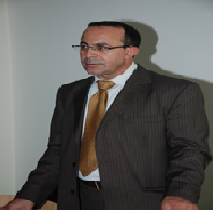
|
Prof. Mohamed TAHIRIProfessor at university Hassan II of CasablancaHow renewable energies help to pass beyond poverty in low income countries?.Biographie et conférence > |
Prof. Mohamed TAHIRI
Professor Mohamed TAHIRI is currently a full professor of Chemistry, water, Bio-energy and environment engineering, Chemical Risks, at Sciences Faculty of Hassan II University of Casablanca
Since January 2010, he’s Chair holder of UNCHAIN-UH2C (University Chair on Innovation). As part of his TEMPUS-supported role, Mohamed TAHIRI has received extensive training in Europe on Innovation, technology Transfer, Intellectual Property Rights and innovation Management.
He holds in his faculty a Bachelor on sanitation management in urban areas.
Professor Mohamed TAHIRI is awarded :
Hassan II Prize on Environment on 2009 by his contribution to disseminate citizen eco initiatives in Moroccan university.
Excellence Palm from AFP-USA(Washington on 2012) for his contribution to sustainable development in Africa ; and University-Enterprise Competitiveness 2014 with R&D NGO of Industry Ministry and High Education Ministry.
Abstract of the presentation
Access to energy for low and middle income countries is one the most important challenges facing humanity in coming years. In fact, energy plays a fundamental role in shaping the human condition and is the key to socio-economic progress. Furthermore, the relevance of energy in the international scenario rises constantly and the many interconnections with environment and society are clearly shown. Until the past decade, The most utilized way of producing energy is unsustainable and threatens the environment on both local and global scales. Developing countries have 80% of the word population and consume only 30% of global commercial energy. The lack of access to electricity and the reliance on traditional biomass as main source of energy hinder the path out of poverty for many people in these countries. The need to increase access to clean, efficient, affordable and reliable modern energy services for balancing the economic, social and environmental dimensions is worldwide recognized. Affordable energy services are key elements of economic development and eradication of extreme poverty as called for in the United Nations Millennium Development Goals (MDGs). Building enterprises and creating new jobs, improving health and education, and providing basic needs such as food and water in an economical and sustainable manner require a balanced energy mix that is suited to the economic, social, and resource conditions of individual countries and regions.

